Titan Quest is one of the old ARPG classics that have probably had a great influence on the future of the genre. The anniversary edition that came out in 2016, with the subsequent expansions in 2017 and 2019 have breathed fresh air into the life of an old classic.
If you, like others, have decided to fire up your remastered version of Titan Quest and are looking to enjoy a fresh boost of nostalgia, you probably might need some inspiration. This guide aims to quickly outline a couple of builds as starter-ideas for your newest Titan Quest adventure.
Mind that these builds are in no way ordered around viability. All the builds are viable and can become very strong. These builds are also designed around not being too gear dependent in order to work.
The Dual Wield Harbinger
This build is one of the bread and butter builds in Titan Quest. It is a melee dual-based build with excellent scalability and the ability to clear the complete content of the game. The focus of the build is offensive stats, favoring kill speed over defenses.
How to skill your Harbinger
I have added pictures of each skill tree for quick reference, saving you some time when swapping around tabs. But if you want to experiment around yourself, I have also added the TitanCalc link to each build.
Titan Calc Link for the Harbinger
The Warfare Tree
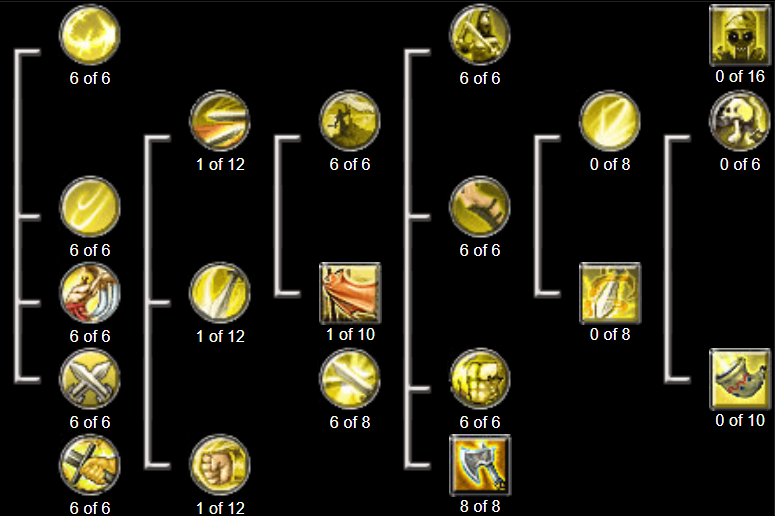
The most important aspect of the Warfare-Tree is the middle section of the tree around Onslaught. The passives are excellent boosters, while the skill itself is going to be your Default-Attack-Skill of choice.
The first row of the skill tree centered around the dual wielding aspects are fairly important as well, but I would not consider them the highest priority.
Grab Battle Standard early if you are having trouble with Boss fights or unique monsters.
If you want to focus on killing bosses and doing boss-runs, I recommend for you to fully max out Ancestral Horn. There is no point in only grabbing one or two points as the pets are way too weak. You will want to max it completely, but it definitely is worth it.
All the other abilities are simple value points or not entirely necessary.
The Dream Tree
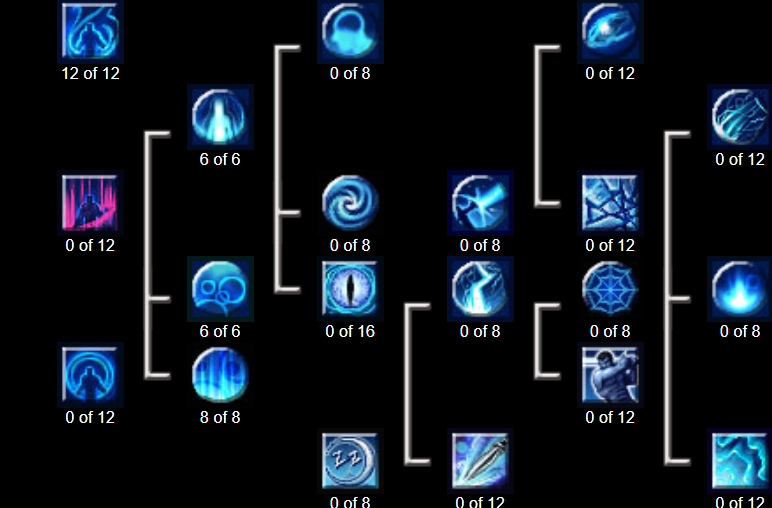
The most important ability of the Dream Tree is Phantom Strike, followed by Distort Reality. Phantom Strike is one of the most important abilities you get and will make your build more versatile and mobile.
Grab Lucid Dream and the other passives, when you have the spare points (low priority), as the passive stat increase is a nice boost.
You can pick some of the other abilities with a couple of value-points as you go, if you think you might enjoy using them. They are not a must but if you have the spare points it is fine to do so.
The Trance Skill of your choice is more a question of preference. However, since this build focuses on dealing out damage before dying, we go for Trance of Wrath
This is the most well-rounded way to build around the character.
Attributes
You shouldn’t need much health or energy. Only invest in those if you feel the need to have some extra energy or want to add tankiness. We don’t put anything into Intelligence and invest most of our points in Strength. Also, invest a couple of points in Dexterity. There is no golden rule here, but I would advise you to go with 3 to 1.
| Strength | 3 |
| Intelligence | 0 |
| Dexterity | 1 |
The Caster Elementalist
The Elementalist is one of the classic caster builds in Titan Quest. It’s a mix of Storm and Earth and you could theoretically play it as a melee too. We however are going to focus on ranged spells. Mind, that it doesn’t matter which mastery you begin with, but we will start with Earth.
Titan Calc Link for the Caster Elementalist
The Earth Tree
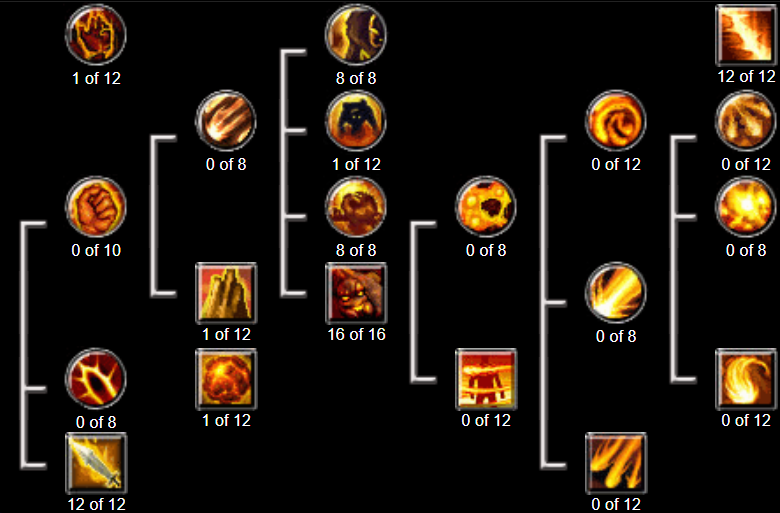
Your first important skill is going to be Earth Enchantment, which you should max out. Theoretically, you could go for the Storm Enchantment as well (see below) or use both. Keep in mind, that it depends on what kind of staff you want to use. Definitely focus on one type of damage and one enchantment if you want to save up skill points in the beginning. No need to get the other passives of the first row as they’re useless for a caster. You can get one value point in Volativity
Grab one value point in Heat Shield and Stone Form as well. Both abilities have excellent defensive utility and Stone Form essentially serves a panic button. It can be very useful for situations where you feel overwhelmed or are waiting for a crucial cooldown to come off.
Theoretically, you have lots of freedom when choosing the offensive spells you want to use and you can certainly pick out others from the ones that have been recommended here. However, Eruption is one of the strongest offensive spells you can choose and should be maxed.
Also, pick Core Dweller and max it out. A pet like that will help you greatly, as your character build leaves you vulnerable and rather squishy. Core Dwelleler can tank enemies and serve as a meat shield. Also pick up some of the passives for Core Dweller, particularly Metamorphosis to make it tankier.
Small tip: You can cast Heat Shield on your Core Dweller in crucial situations.
The Storm Tree
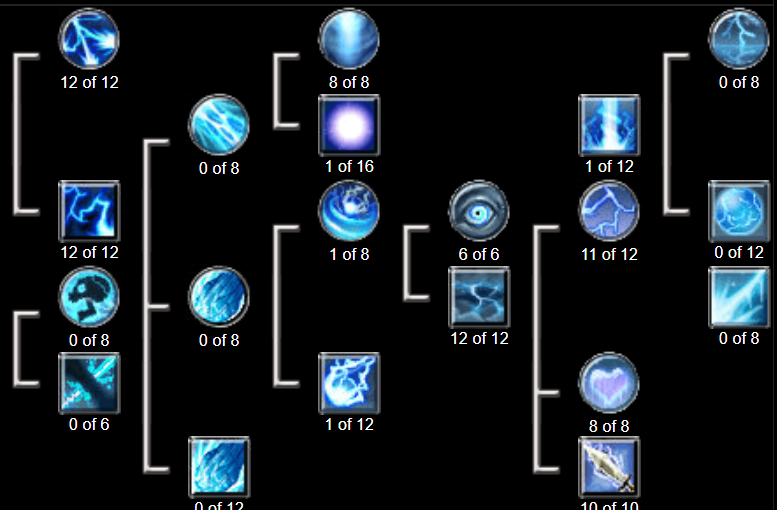
As mentioned above, Storm Nimbus is the enchantment of the Storm Tree and can be either picked together with the Earth Enchantment, or played alone depending on the kind of weapons you want to use. Mind that Storm Nimbus has a couple of synergy skills making it extra useful and if you opt-out of it, you will save out more skill points.
Grab Lightning Bolt and also max Chain Lightning while you are at it. Those are very solid offensive skills and are going to be especially useful when fighting large quantities of mobs.
Get a value point for Thunderball and Concussive Blast. While these skills are not essential, they offer quite the utility, as the Thunderball stun can come in quite handy at times.
Pick Summon Wisp for one point and max out the synergy skill Eye of the Storm. Eye of the Storm offers solid elemental resistances and will improve your defensive capabilities.
Squall and Obscured Visibility is another great utility spell that should prove very useful in difficult fights.
Lastly, get a value point in Storm Surge. The chance of activating is 15% from level 1 on and it stuns enemies. In fights with lots of monsters, it will trigger quite often and can sometimes even save you.
Attributes
Health and Energy should not be needed, although sometimes and depending on your gear, you might need to add in some points into energy.
Completely ignore Strength and grab a few points in Dexterity depending on whether you would need it for any armor. Invest the rest in Intelligence.
| Strength | 0 |
| Intelligence | 1 |
| Dexterity | 0 (whatever is needed for gear) |
The Assassin
The Assassin is the class combination of Warfare and Rogue and is one of the most offensive melee classes out there. It severely lacks in terms of defense but yields a very high damage output in return. Additionally, it is one of the more complicated classes that can be too squishy in the later parts of the game if not planned well.
TitanCalc Link for the Assassin
Warfare Skill Tree
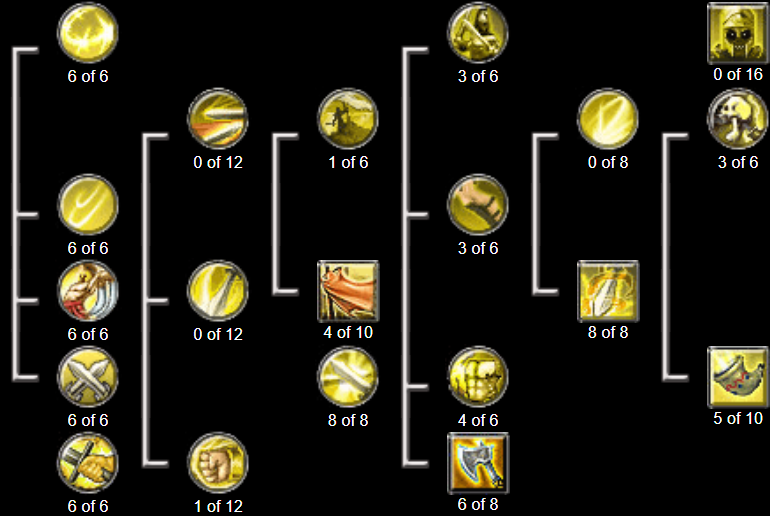
The first row of the Warfare Skill tree is almost always very strong and should be maxed. For the Assassin it is no different as you will be dual-wielding, making the Dual Wield passive and all the synergies extremely useful and maxing them a must. Maxing Weapon Training is also recommended as the stat boost is significant enough, but it is not the highest priority.
One value point in Battle Rage is always useful, as the +50% offensive abilitiy are quite strong and the trigger chance already starts out at 8%.
Definitely grab and max the Dodge Attack passive, particularly when you are starting to feel squishy. We do not have a lot of defensive resources, making a passive like that extremely valuable.
Same goes for Battle Standard (around 4 levels) and one value point in Triumph. Battle Standard is more useful for boss encounters, but you might have trouble with those particularly in the beginning.
Whirlwind is one of the most valuable skills we have and should be maxed quickly. The charge offers great mobility and clearing speed, and the fact that it hits up to 4 enemies gives us valuable area of effect and synergy with Rogue skills.
Invest at least some (minimum one) points into War Horn and Doom Horn as a utility skill. Sometimes the stun can save your live, particularly if you are being overwhelmed by too many enemies.
The Ancestral Horn is optional and particularly useful for boss fights, but should only be used if you are planning to max it out, as it is rather useless in lower levels.
Rogue Skill Tree
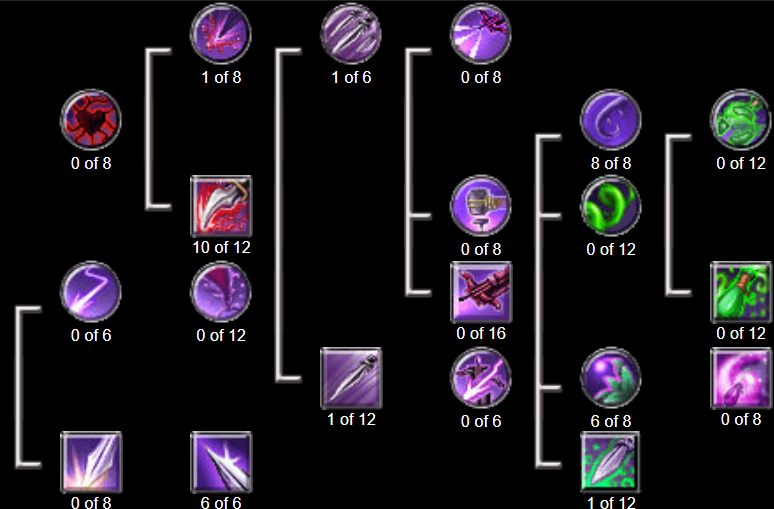
Lethal Strike is very valuable and should be picked in the Rogue Tree. It has an insane amount of damage and is probably one of the strongest Rogue skills. The synergies are not particularly good though, so just get a value point.
Blade Honing is a buff that provides a solid boost and is worth all the points. Envenom Weapon on the other hand should stay on level one, while the synergies, Nightshade and Mandrake should be leveled. Mandrake is very useful and is going to drastically raise your survivability.
You could consider leveling all the poison skills, but you should only do so if you actually plan to revolve your build around poison. For us, just getting the extra utility and the damage boost.
Lastly, get a value point in Throwing Knife and Flurry of Knives which are optional. The combination here means that you can quickly spread your poison around multiple enemies with Flurry of Knives. Flash Powder is another optional utility skill that can be picked if necessary.
In general, we don’t pick many skills from the Rogue tree, only what is really necessary. A lot of skills like bleeding or poison skills are only useful if you really commit to that kind of damage. The same goes for traps, but those would be considered a preferential pick as well. The utility and buff skills however are very good and highly valuable.
Attributes
Health and Energy should definitely not be an issue here unless you need some extra Energy to cast all your skills. Completely ignore Intelligence and spread your points around Strength and Dexterity. A recommended ratio would be 2:1 Strength/Dexterity.
| Strength | 2 |
| Intelligence | 0 |
| Dexterity | 1 |
Weapon choice for Assassin
When playing or planning for an Assassin, you should consider the limited weapons that are available for your build. In order to get the best of both masteries, you are forced to pick the sword.
The reason for it being is that Rogue Mastery relies on Piercing Damage, like swords, spears, and bows. Warfare on the other hand favors axes, clubs, and swords. With swords being the only common denominator, the pick is fairly obvious. Mind Dual Wielding will be necessary for maximum efficiency, as Assassin mostly revolves around Dual Wielding.
The Ranger
The Ranger is the classic ranged type hunter build consisting of the Hunting and Nature Masteries. It is possible to play as a melee ranger if you pick the spear as your main weapon, but for this build, we will go for the bow as a weapon.
Hunter Skill Tree
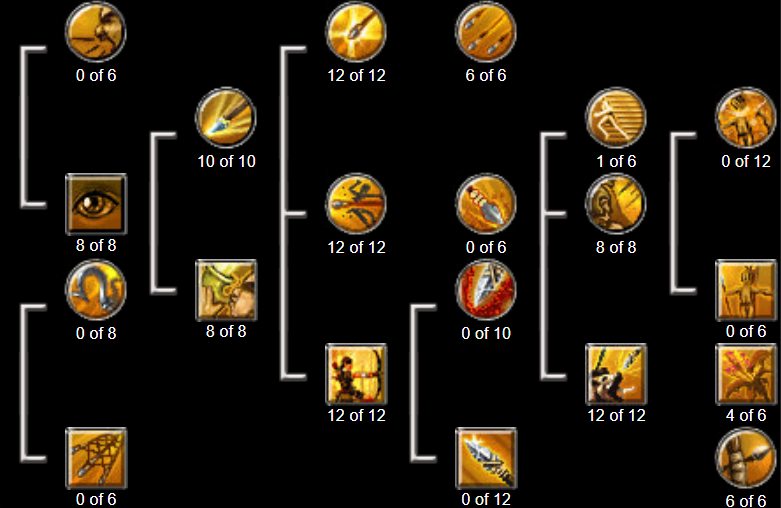
The Hunter skill tree is clearly the favored one for us, giving us the best skills and greatest damage boosts for our bow. As you can see, we are going to pick many skills from this tree, as many of them are extremely useful and valuable. Naturally, it is advised to go for this tree first.
The most important skills particularly in the beginning are the skills around Marksmanship. Pick Marksmanship and all the synergies and max them. Particularly Scatter Shot Arrow is going to be an insane boost in terms of clear speed and dealing with multiple enemies.
Call of the Hunt and its synergy Exploit Weakness are superb temporary buffs. Art of the Hunt has a similar role and should be maxed out completely, except for Trail Blazing where one value point should be enough.
Volley and Wood Lore are powerful passives that you should get as quickly as possible and also max them out.
Lastly, pick Study Prey as an additional short term debuff and Herbal Remedy as a defensive resource whenever you feel that it is necessary.
Nature Skill Tree
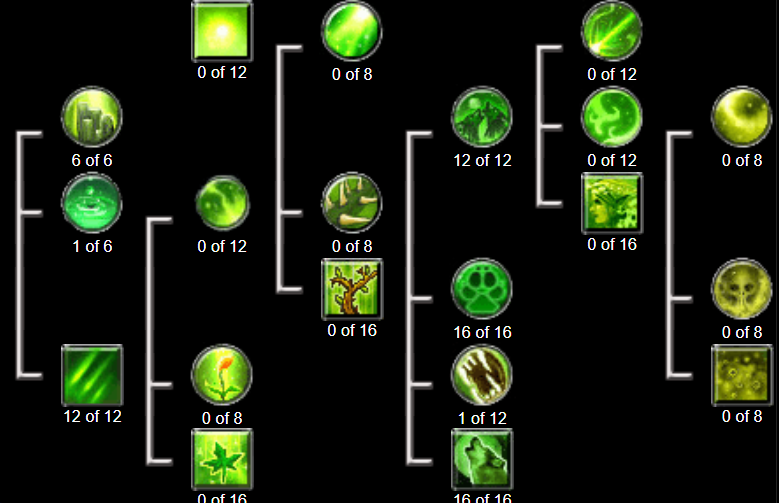
The Nature skill tree is going to help us in terms of defenses and utility, as well as add some pets that can always help as meat shields.
Heart of Oak and its synergies is an excellent defensive ability and should be skilled as soon as you start feeling squishy.
The other main part of the Nature Skill tree is the wolves and all the synergies around that. Call of the Wild allows you to summon up to two wolves that are going to help you out and be useful in terms of pulling aggro from mobs. Grab one value point of Maul for the 6% reduction of enemy health and also to be able to skill Survival Instinct and Strength of the Pack. Both of these synergies are going to boost your wolves’ strength and make them tanky enough to actually fulfill their purpose as meat shields.
As you can see, we don’t pick many other skills from the Nature tree, mostly because we have already invested many skill points into the Hunter skill tree. If you want to play more around with pets and get more Nature skills, you will have to cut some of the Hunter skills in return.
Attributes
As always, ignore Health and Energy unless you feel the necessity to get some more points into Energy. Ignore Intelligence and add your points equally into Strength and Dexterity.
| Strength | 1 |
| Intelligence | 0 |
| Dexterity | 1 |
The Soothsayer
The Soothsayer is a Spirit and Nature build. Both of these trees are rather focused on providing support and buffs, which gives the Soothsayer the right tools to play some sort of Beastmaster or a character that heavily relies on pets. Your trees give you the choice of multiple pets, but you will not be able to get them all in your tree.
The main choice will be between the Liche King and the Wolves. You can pick whatever you want and you could theoretically try to go for both (although this is going to cost you many more skill points). Since our Ranger build already features wolves, we will focus on the Liche King in this build.
Spirit Tree
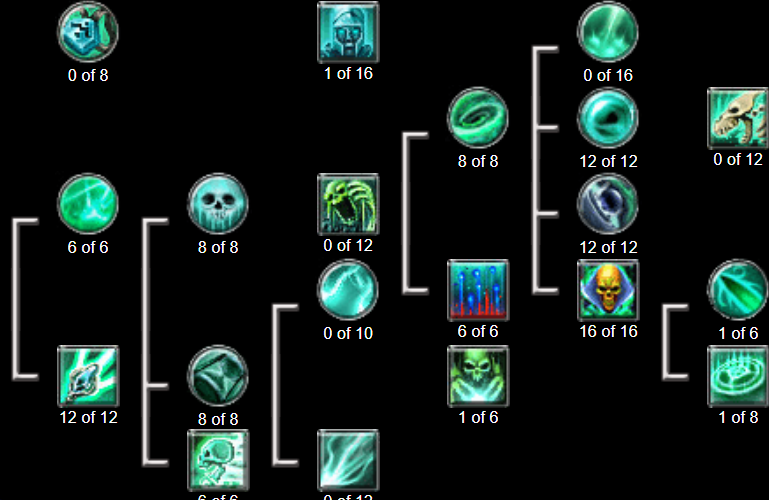
Ternion Attack is one of the first spells that are available to you and since as a Soothsayer, you will probably rely on staves, it is advisable to max this one out. In general, there is no point in using Ternion Attack and its synergy unless you want to max it out. It is however not absolutely mandatory for this build and you could opt-out of it if you want to.
The Deathchill Aura, along with Ravages of Time and Necrosis is a debuff that has a rather low range but very powerful effects and should definitely be maxed.
You could potentially pick up Life Drain and Enslave Spirit temporarily (meaing you should spec out of it later) as bridge skills to use until you reach your Liche King ability. They are quite good, but just don’t scale that well into the lategame.
Summon Outsider and Vision of Death are both excellent value point candidates.
Dark Covenant and its synergy Unearthly Power should be maxed for its excellent utility value. You gain extra damage as well as mobility in form of movement speed, along with a little bit of energy regeneration. Just mind that these skills drain your life, so use them at the right time.
Most importantly, the Liche King himself should definitely be maxed along with all synergies except for Arcane Blasts. Death Nova is an extremely strong skill that the Liche will gain, while Wraith Shell will make him much tankier. Arcane Blasts however is not very useful as it does not do that much damage and the Liche King tends to cast it much more than Death Nova essentially hurting your effective DPS.
As you can see, all these skills take up lots of skill points, but they also are the main skills of this build.
Lastly, one point in Spirit Ward and Spirit Bane will boost your strength against Undead enemies, which is useful as you meet quite a few Undead enemies in the game.
Nature Tree
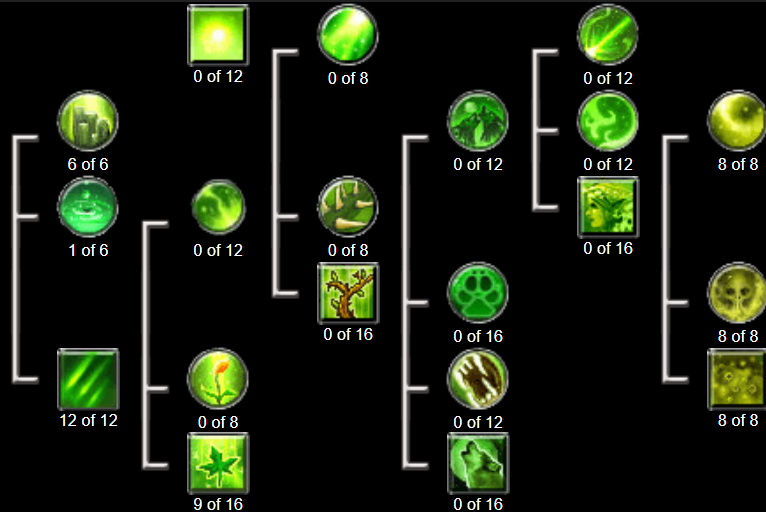
The Nature tree will pretty much exclusively aid us with buffs, heals, and debuffs. Nature is particularly useful as it will grant you abilities to target your pets with and the buffs all work as auras, boosting your pets along with you. It should be obvious that many abilities of this tree are fairly useless if you don’t have any damage abilities or your Liche King pet. So take your time leveling them and focus on the Spirit tree first.
Heart of Oak is an excellent buff/aura and will boost your pet’s stats as well. One value point in Tranquility of Water for the initial 8% should help out with Energy problems if you face those, while Permanence of Stone is going to add an extra layer of defense with its Elemental Resistance.
Regrowth is super helpful both to heal yourself and to keep your pet on high HP. You don’t need the synergies as you will mostly play with one pet, namely your Liche King. If you had wolves, the synergies would come in handy, so keep that in mind.
Lastly Plague with Fatigue and Susceptibility is an extremely strong debuff with very powerful effects. Plague will be a very useful resource in dealing with groups of enemies and your pet will profit from the debuffs as well.
Attributes
Attributes are fairly simple for the Soothsayer. Ignore Health and Energy completely, unless you feel running out of Energy quickly or you want to give you some extra survivability with more Health. There is basically no need for Strength or Dexterity, which leaves all the points for Intelligence. Since you are going to play a caster-type mage, the Intelligence will come in handy.
| Strength | 0 |
| Intelligence | 1 |
| Dexterity | 0 |
Wolves Version
If you want to play with wolves instead of the Liche King, the tree essentially stays the same. The only difference is that you pick the Wolf passives and its synergies instead of the Liche King.
Conclusion
There are dozens of other Titan Quest Builds for you to explore, and if you feel like choosing another character or a different skill tree, you should definitely do so and explore the game yourself. Even though Titan Quest is such an old game, it is a classic with lots of replayability and many playstyles to explore.
These Titan Quest Builds are simply suggestions and can be safely used if you are unsure on which way to go with your characters. If you have any criticism, suggestions or additional advise, feel free to comment below!
Like this guide? Donate a coffee to us!


